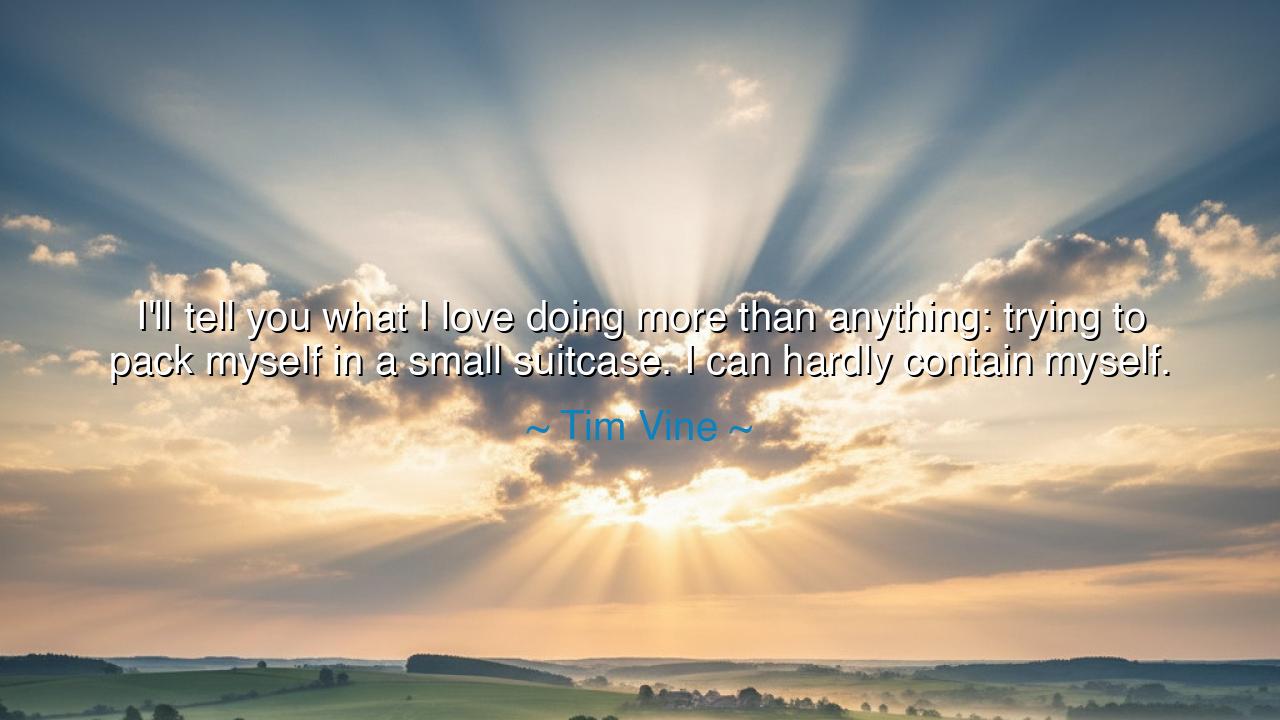
I'll tell you what I love doing more than anything: trying to
I'll tell you what I love doing more than anything: trying to pack myself in a small suitcase. I can hardly contain myself.






In the lighthearted wit of Tim Vine, master of the quick jest and playful word, we find this curious saying: “I’ll tell you what I love doing more than anything: trying to pack myself in a small suitcase. I can hardly contain myself.” At first, it draws a laugh, for it is a pun — clever and sharp, a twist of phrase that delights the ear. Yet beneath the humor, as in many of the fool’s words, there lies a subtle wisdom. The ancients themselves often hid truth in laughter, for humor disarms the mind and opens the heart. And so, though this jest seems simple, it can be read as a parable — about self-expression, joy, and the struggle to contain the vastness of the human spirit within the narrow confines of life.
The origin of this thought lies in the very art of comedy itself. Comedians like Tim Vine are heirs to the ancient tradition of the jesters and storytellers — those who could speak truth in laughter and offer lightness in dark times. In old courts and crowded taverns, the fool was often wiser than the king, for he alone could speak the truth without punishment. Thus, when Vine jokes that he can "hardly contain himself," he echoes an ancient truth about the overflowing nature of joy — that happiness, creativity, and wonder cannot be confined. The heart, when truly alive, bursts forth like water seeking release, refusing to be trapped within the ordinary boundaries of existence.
To “pack oneself into a small suitcase” can also be read as a metaphor for the limitations we place upon ourselves. Many live their lives as though trying to fit their vast dreams, emotions, and potential into a box too small for their souls. They suppress their laughter, silence their ideas, and fold their ambitions until they barely recognize their own greatness. But the spirit, like Vine’s humor, resists confinement. It longs to stretch, to expand, to express itself without apology. The moment one “can hardly contain” oneself is the moment one has touched the edge of true freedom — the boundless energy of being fully alive.
There is a story told of the artist Leonardo da Vinci, who as a young man was chastised by his teacher for experimenting too much, for wandering beyond the prescribed rules of painting. But Leonardo could not “contain” himself within the box of convention. His mind was too vast, his curiosity too fierce. And so, he let his imagination spill over — into anatomy, invention, architecture, and flight. His laughter, like Vine’s, came not from foolishness, but from the joy of creation itself. Thus, the lesson hidden in humor reveals itself: those who live fully, who embrace their passions, cannot — and should not — be confined.
Even the laughter within Vine’s words carries its own sacred power. To laugh is to break boundaries. It shatters fear, lightens sorrow, and unites strangers. Ancient healers believed laughter restored the balance of the soul, for in joy we rediscover the divine spark within. When Vine makes us laugh, he offers a gift far greater than amusement — he reminds us of the limitless energy of the human spirit, and how easily we forget it amid the dull seriousness of daily life. In laughter, we glimpse the truth that the spirit of man, like the cosmos, expands endlessly.
And yet, the suitcase in Vine’s imagery is also a symbol of humility. To laugh at oneself is to show wisdom, for the proud man cannot joke about his own smallness. Humor humbles us, reminding us that we are fragile beings — brief travelers in a vast universe — yet capable of joy even in absurdity. The great philosopher Socrates, though a man of reason, once said that wisdom begins with self-awareness. Laughter is that awareness clothed in warmth. To see the comedy in our struggles, to “hardly contain ourselves” with laughter even when life feels heavy — this is a mark of spiritual strength.
So, my dear listener, take this jest as more than amusement — take it as teaching. Do not pack yourself too tightly within the constraints of expectation or fear. Do not silence your laughter, your curiosity, or your wonder. Let your spirit overflow. Be bold enough to take up space in this world — to express, to love, to create, and to laugh. For life, in its briefness, demands not quiet restraint, but joy uncontained.
Thus, as Tim Vine reminds us through humor, the greatest wisdom often comes wrapped in laughter. The soul that can laugh, even at itself, is the soul that remains free. So laugh deeply, live largely, and when joy fills you to the brim, do not try to pack it away — let it spill into the world like sunlight bursting from a suitcase too small to hold it. For in that laughter, you will find not foolishness, but the truest wisdom of all.






AAdministratorAdministrator
Welcome, honored guests. Please leave a comment, we will respond soon